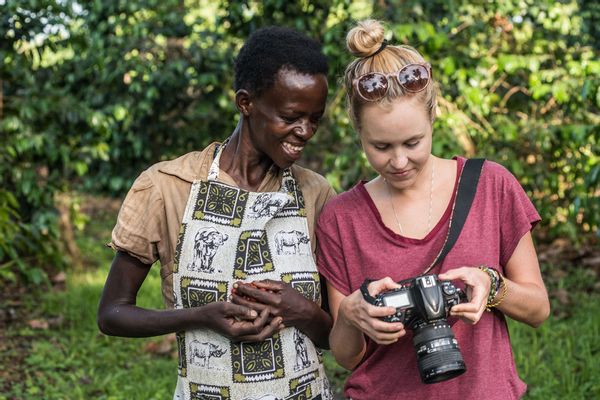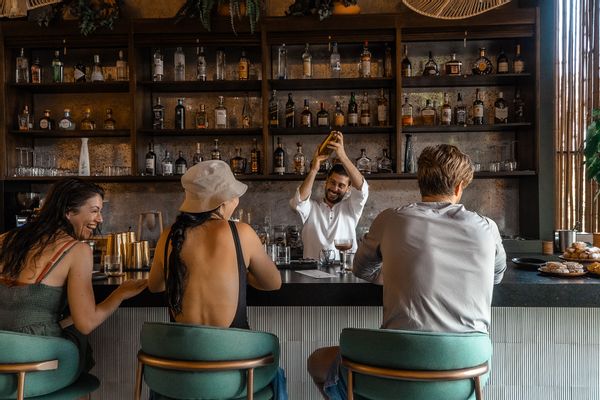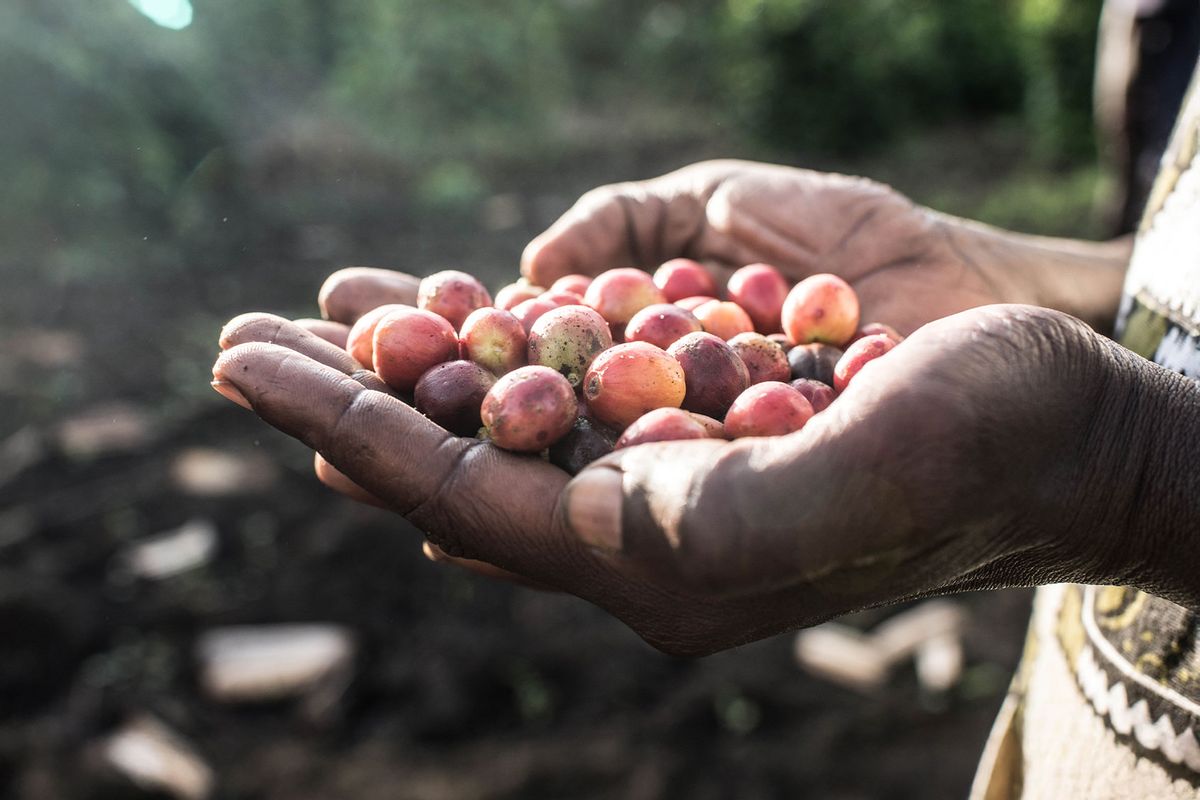Americans are jittery—and not just for the reasons you’re thinking. Lattes, flat whites, cold brews, cappuccinos; we’re drinking more coffee than ever before. Blend that with the rise in culinary-focused trips and coffee tourism is boiling over.
Vietnam is the world’s second-largest coffee producer, specializing in a heart-palpitatingly strong Robusta. At the Four Seasons Nam Hai in Hoi An, Vietnam, the resort launched its sustainable coffee program, Ethical Cup, in 2023. This signature guest experience invites coffee lovers to gather on plastic stools—Viet style—to make their own brew. Each cup is handcrafted from organic beans grown on local farms and includes Vietnam’s signature phin drip coffee.
Plus, guests are treated to a complimentary coffee tasting every Wednesday. As you sip on a sữa đá (Vietnamese coffee and condensed milk), you’ll learn about the history of coffee production in Vietnam and its French colonizer roots. Once you’ve become fully addicted, the resort offers concoctions like sparkling lemon coffee and pistachio affogato on its menu.
From history to activity, coffee continues to inspire travelers across the globe. Down Under, in Melbourne, they take their coffee seriously. Arguably the world’s most concentrated coffee capital, the city’s alleys are filled with cafes selling flat whites and Mont Blancs. Learn about the city’s obsession on a morning coffee tour with Walk Melbourne, where you can try four different coffees from four different standout cafes, led by a local caffeine connoisseur.
Across the world, in its British capital counterpart, One Aldwych offers a unique, historical coffee tour. As part of its “Curator” program, Dr. Matthew Green leads guests on a two-hour experience through Covent Garden, where the city’s earliest coffee culture emerged. Known as “bitter Mohammedan gruel,” guests can try London’s earliest form of coffee, brewed just like it was in the 1700s.
On the Spanish island of Mallorca, Jumeirah Mallorca combines coffee and cycling. A trend on the island, you’ll find hordes of helmet-clad riders at various cafes, fueling up for their next ascent. The hotel’s newest offering is a 30-mile Coffee Ride to Valldemossa, which begins and ends with a cup of local roast.
We need your help to stay independent
And in the Middle East, coffee is as essential as water. Replacing alcohol, many practicing Muslims drink multiple cups per day. In Dubai, the two-story Coffee Museum offers a deep dive into the origins, folklore, relics and evolution of coffee around the globe. Museum-goers get a complimentary cup but finish the tour at the museum’s cafe to try Ethiopian coffee, where the museum says the beans were invented.
Not far from coffee’s origins, in Uganda, the Kyambura Women’s Coffee Cooperative employs twenty local women, many of whom are HIV-positive or widowed. This community initiative looks after 2,500 hand-planted coffee bushes over 100 acres. These organic beans then get sent to Volcanoes Safari’s five luxury lodges spread throughout Uganda and Rwanda.
“For those based at Kyambura Lodge, a visit to our 50-acre coffee farm is a favorite activity after a chimpanzee trek or game drive. Here, they can meet the inspiring women behind the project, learning firsthand how African coffee is harvested and processed by hand,” says Kyambura founder Praveen Moman. “Many enjoy joining in the process and leave with a bag of beans, knowing their purchase directly supports this group of women.”
 Kyambura Women’s Coffee Cooperative employee and photographer looking at camera (Photo courtesy of Volcanoes Safaris)
Kyambura Women’s Coffee Cooperative employee and photographer looking at camera (Photo courtesy of Volcanoes Safaris)
Coffee plants thrive in tropical, humid climates with rich soil and stable temperatures. Jamaica’s Blue Mountains offer the perfect environment for world-class coffee beans. At Devon’s Coffee Ranch Tours, a father and son duo give tours of their harvesting process, followed by a coffee tasting and a farm-to-table lunch.
"We have been growing coffee for about five decades, spanning a few generations of our family. We started coffee tours about fifteen years ago, just after the world recession when coffee prices declined, making it unsustainable for farmers to maintain coffee production,” says co-owner and operator Howard Thomas. “Since then, we have noticed a steadily growing demand for Blue Mountain coffee itself and experiences in the region.”
Few destinations have capitalized on their coffee reputation as much as Costa Rica. Arguably the world’s coffee tourism capital, it has a huge variety of tourism activities designed for coffee addicts. At Hotel Belmar, they grow their own coffee beans on their onsite organic farm. Its free coffee explainer experiments with two different harvests, roasts and brewing methods, followed by a debrief on the beans’ roots, brought over by the Spanish during their colonization in the 1700s.
 Head barista Luis Carlos Herrera preparing a drink at the Andaz Peninsula Papagayo Resort (Photo courtesy of Andaz Costa Rica Resort at Peninsula Papagay)In the country’s south, the adult-only resort Hotel Three-Sixty offers a full-body coffee experience. The day starts with a variety of locally grown coffees delivered to the room, followed by a coffee scrub at its rainforest spa. And at the Andaz Peninsula Papagayo Resort, the head barista traveled the country to hand-pick the best beans from rural farmers for their signature coffee program. His findings resulted in incredibly rare blends, like a honey-processed bean and a natural bean that transforms under a fermentation process, showcased at the resort’s 90-minute “Becoming A Barista” offering.
Head barista Luis Carlos Herrera preparing a drink at the Andaz Peninsula Papagayo Resort (Photo courtesy of Andaz Costa Rica Resort at Peninsula Papagay)In the country’s south, the adult-only resort Hotel Three-Sixty offers a full-body coffee experience. The day starts with a variety of locally grown coffees delivered to the room, followed by a coffee scrub at its rainforest spa. And at the Andaz Peninsula Papagayo Resort, the head barista traveled the country to hand-pick the best beans from rural farmers for their signature coffee program. His findings resulted in incredibly rare blends, like a honey-processed bean and a natural bean that transforms under a fermentation process, showcased at the resort’s 90-minute “Becoming A Barista” offering.
"My journey to hand-select the best beans took me across the country, where I worked closely with dedicated farmers to understand every step of the process from planting to harvesting,” says Luis Carlos Herrera, Andaz Peninsula Papagayo’s Head Barista. “We aim to share this passion and knowledge, allowing travelers to not only taste these incredible varieties but also gain a deeper appreciation for the craft and culture behind every cup."



Shares